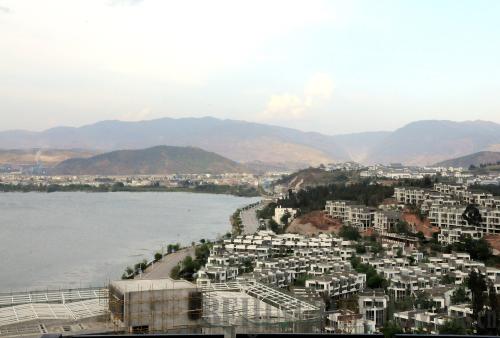|
 |
|
COSTING NATURE: Villas built on a filled lake and surrounding area in Dali, Yunnan Province, have triggered widespread criticism of illegal property development (LI QIAN) |
Gasoline Woes
Since mid-March, a number of cars of different brands in several cities of central China's Henan Province have reported sudden failures. All of the malfunctioning cars shared the same symptoms: fuel difficulties, stinking exhaust fumes or the eruption of red or black liquid, ignition incapability, even damage to auto parts.
As the cars are of different brands in different regions, it seems not a problem of the cars, or of drivers' misdeeds, or weather and road problems. As a result, many car owners and maintenance professionals point the finger at gasoline provided by Sinopec Corp., China's largest oil refiner. Sinopec's Henan branch has acknowledged the blame and promised compensation to car owners.
In accordance with China's gasoline criteria, sulfur content in gasoline must be lower than 0.08 percent and olefin lower than 35 percent. The global standard for sulfur is lower than 0.02 percent and olefin lower than 20 percent. Even an analysis report released by Sinopec reveals that China's gasoline and diesel quality falls far behind international standards, which leads to a greater quantity of exhaust emissions polluting the environment, and also seriously damaging auto parts.
In these cases, compensation to consumers is necessary, but the most important thing is for oil companies such as Sinopec to learn their lessons and offer high-quality refined oil products to customers. Since they have consistently called for keeping up with international levels in terms of fuel price, why don't they first try to catch up with foreign counterparts in quality?
Changjiang Daily
Curbing and Guiding
Recently, the Chinese Government unveiled a rafter of policies to rein in the country's overheating real estate market, such as increasing down payments and mortgage rates for second-home buyers and banning loans for third-home buyers. These policies are undoubtedly a heavy blow to real estate speculators, but to reverse fundamentally the crazy rush of speculative capital into the property market, there must be more outlets for them.
People do need to keep the value of their assets. However, China has limited investment channels open to the public. Worse still, the global financial turmoil has worsened the business environment for China's manufacturing sectors. Additionally, due to urbanization and rising housing demand, the real estate market appeals as a highly profitable investment area.
The real estate sector does contribute to economic growth, but the sector alone is unable to sustain the country's overall economy. More seriously, bubbles will swell in the property market, jeopardizing the country's overall economic growth.
Compared with the property market, many emerging industries are demanding huge amounts of capital for further growth. Diversification of investment channels is not only an effective way to cool down the feverish property market but will also help to improve China's economic growth pattern.
Beijing Daily
Recovery Matters More
Dali in southwest China's Yunnan Province is a famous tourist destination. The beautiful Lovers' Lake there was once a scenic spot, but has now been filled to make land for villas. Because of this damage, villa owners and developers have been fined 40 million yuan ($5.9 million).
The local government pledged to investigate and fine those responsible, but by no means plan to recover the lake's damaged ecological system. The consequence is, after being fined, villa owners will then be able to retain their properties.
As for dealing with environmental pollution, a basic principle is: Those who pollute take responsibility for the clean-up. If polluters could shake off any responsibility after being fined, then damage would not decrease but increase.
As the villas are sold at very high price, even with the fines deducted, developers still make a lot of profits. Meanwhile, the huge fines mean big income for the government. For these two sides, it's almost a win-win deal, only the buyers have to bear huge losses.
To fine the ruiners of the environment is necessary, but more important is recovering the damaged ecological system. Maybe the local government has difficulty in recovering the ecological system, but the "fine and tolerate" policy is totally wrong.
The Beijing News
Heroes' Needs
On April 12, the awards ceremony for college students of the year 2009 in central China's Hubei Province was held in Wuhan. The awardees included 15 students from Yangtze University who jumped into the Yangtze River to rescue two drowning children last October. Three of the students lost their lives in the swollen river. The students' deeds won them high praise. As to how many awards they had received, the university's vice president said he was already unable to count.
However, frequent social activities have greatly disturbed these students' studies. Some of them even failed to pass last semester's final examinations because of a lack of study time.
It's great that the heroes were so warmly embraced, but first of all, they are students. No one hopes to see their future ruined by endless social activities. What they need are not endless awards but peaceful desks for study.
Qilu Evening News
| 